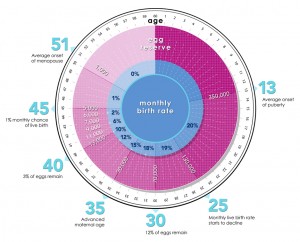 Women whose mothers experienced early menopause are themselves likely to have an accelerated decline in fertility, Danish researchers found.
Women whose mothers experienced early menopause are themselves likely to have an accelerated decline in fertility, Danish researchers found.
Median serum levels of an important marker of ovarian reserve, anti-Müllerian hormone (AMH), declined by 8.6% (95% CI 6.4 to 10.8,P<0.001) yearly in women whose mothers entered menopause at or before age 45, according to Janne Gasseholm Bentzen, MD, PhD, and colleagues from the University of Copenhagen.
In contrast, women with maternal menopause at ages 46 to 54 had a decline in median AMH of 6.8% (95% CI 5 to 8.6, P<0.001) each year, while those with later maternal menopause had an annual decrease of only 4.2% (95% CI 2 to 6.4, P<0.001), the researchers reported in Human Reproduction.
During recent decades many women have delayed childbearing, with the possible result that they may then have difficulties in conceiving if their ovarian reserve has begun to be depleted and oocyte quality lost. Many population-based studies have demonstrated a strong component of heritability for age at menopause, but whether this influence extends to fertility and ovarian viability has been unclear. Read full article.